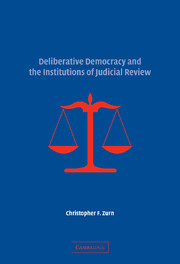Book contents
- Frontmatter
- Contents
- Acknowledgments
- 1 Introduction
- 2 Majoritarian Democracy and Minoritarian Constitutionalism
- 3 From Majoritarian to Deliberative Theories of Constitutional Democracy
- 4 Deliberative Democracy and Substantive Constitutionalism
- 5 Disagreement and the Constitution of Democracy
- 6 The Seducements of Juristic Discourse as Democratic Deliberation
- 7 Constitutionalism as the Procedural Structuring of Deliberative Democracy
- 8 The Institutions of Constitutional Review I: Design Problems and Judicial Review
- 9 The Institutions of Constitutional Review II: Horizontal Dispersal and Vertical Empowerment
- Bibliography
- Index
- Table of Cases
3 - From Majoritarian to Deliberative Theories of Constitutional Democracy
Published online by Cambridge University Press: 18 July 2009
- Frontmatter
- Contents
- Acknowledgments
- 1 Introduction
- 2 Majoritarian Democracy and Minoritarian Constitutionalism
- 3 From Majoritarian to Deliberative Theories of Constitutional Democracy
- 4 Deliberative Democracy and Substantive Constitutionalism
- 5 Disagreement and the Constitution of Democracy
- 6 The Seducements of Juristic Discourse as Democratic Deliberation
- 7 Constitutionalism as the Procedural Structuring of Deliberative Democracy
- 8 The Institutions of Constitutional Review I: Design Problems and Judicial Review
- 9 The Institutions of Constitutional Review II: Horizontal Dispersal and Vertical Empowerment
- Bibliography
- Index
- Table of Cases
Summary
Before turning to the deliberative democratic arguments for and against the judicial institutionalization of constitutional review in subsequent chapters, it will help to have some rough sense of the basic theoretical distinctions and issues that will repeatedly reappear. My contention in those chapters is that the most important differences between the various arguments can be captured by attending to the underlying conceptions of “democracy,” “constitutionalism,” and their interrelationships in “constitutional democracy” that the various theories employ. And, as I hope to be able to show, the most convincing accounts of how the function of constitutional review should be institutionalized depend not only on empirical and prudential considerations arising from realistic appraisals of the performance of extant political institutions but also on normative considerations about the acceptable shape of political decision-making processes. Thus, it will help to get at least a clearer articulation of the central analytic and normative concepts applied.
DELIBERATIVE DEMOCRACY: FOUR AXES OF ANALYSIS
Major transformations have occurred in the last fifteen to twenty years of normative democratic theory, that is, in those theories that attempt to justify principles of political morality that should govern the structures of social and political institutions in contemporary democratic societies. This section focuses mainly on those changes initiated by one major subgroup of theorists: those who can plausibly be considered deliberative democrats. The various issues and problems ranged under this banner are wide and diverse.
- Type
- Chapter
- Information
- Publisher: Cambridge University PressPrint publication year: 2007



